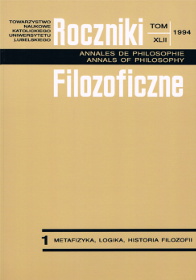Impossibilia Sigera z Brabantu
Abstrakt
Apart from lectures the main method of teaching in the universities of the Middle Ages was disputation. It was the purpose of the disputations to exercise in upholding theses by appriopriate argumentation and in solving scientific or philosophical questions. The objects of disputations in the faculties of arts were questions of grammars, of rethoric and of logic. But soon the masters of arts began to discuss also philosophical and scientific questions.
The logical disputations are of three kinds: the fallacies (sophismata), the insolubilia, and the impossibilia.
The fallacies are manifold. They may − namely − consist in discordance with rules of reasoning, or in breach of rules of syntax. The insolubile is almost identical with what is called antynomy. The impossibile was a disputation, in which one or several masters of arts have refuted a sentence which was contradictory with any scientific or philosophic principle.
The script Impossibilia of Siger of Brabant is a report of disputation of masters of the Faculty of Arts in Paris with one “sophist” (perhaps sophist-errant). This report contains six impossibilia. The author of the Impossibilia was taking the principles of Averroismus.
Impossibilia of Siger of Brabant are following:
1. Deum non esse (There is no God).
2. Omnia, quae nobis apparent sunt simulacra et sicut somnia. Ita quod non simus certi de existentia alicuius rei (Everything which appears to us is phantom and like a dream. Therefore we are not sure that anything exists).
3. [...] quod bellum Troianum esset in hoc instanti ([...] that the Trojan war is at present (at this instant)).
4. Grave existens superius non descenderet (A heavy body, which is up high without any support, would not fall).
5. In humanis actibus non esset actus malus, propter quam malitiam actus ille deberet prohiberi vel aliquis ex eo puniri (Among human acts no one is wrong, and therefore no malice may be cause to interdict this or to punish for it).
6. Contingit aliquid simul esse et non esse, et contradictoria de se invicem vel de eodem verificari (It happens, that anything may exist and at the same time not exist, and that contrary predicates can verify each other, or both the same thing). The most interesting reasonings are in the third and in the fourth impossibilia.
Copyright (c) 1994 Roczniki Filozoficzne

Utwór dostępny jest na licencji Creative Commons Uznanie autorstwa – Użycie niekomercyjne – Bez utworów zależnych 4.0 Międzynarodowe.





